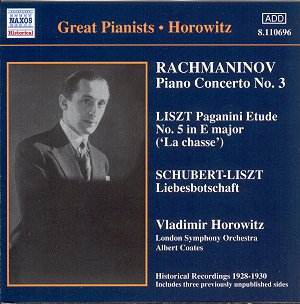Sony and RCA have such a large
inventory of Horowitz recordings that it could be wondered if the
man was on Earth prior to the 1940s. Other recording companies have
fortunately released a host of earlier Horowitz performances, and
this new Naxos Historical disc gives us his first recorded interpretations
from the late 1920s up to 1930.
The main offering on the disc is Horowitz's first of three commercial
recordings of Rachmaninov's 3rd Piano Concerto. An added bonus
is that three of the other eleven pieces receive their first exposure
on record: the Liszt-Paganini Etude No.5, the Schubert-Liszt "Liebesbotschaft",
and Chopin's Etude in F major.
Horowitz's second commercial recording of Rachmaninov's 3rd Piano
Concerto conducted by Fritz Reiner on RCA is generally considered
his best, and I won't argue with that assessment. There is a palpable
sense of excitement, and Horowitz is a whirlwind; another plus
is the vivid soundstage that allows us to hear the great pianist
in his entire splendor.
The sound for the 1930 Horowitz performance is the opposite of
vivid, as it is constricted and extremely dry. Horowitz's playing
never rings out, and he often sounds as if he's performing beneath
the orchestra. However, there are two crucial features that the
sound can't destroy. One is the sizzle of the tension created
by both Horowitz and Coates that is a constant throughout the
work. The other feature is the fiery excitement that Horowitz
can generate even with the disadvantages of 1930 sound technology.
The performance is a compelling one, but Horowitz's 1951 recording
with Reiner has to take first prize with its more vivid soundstage.
The solo piano works are enjoyable, but the program tends to
emphasize technical virtuosity more than emotional depth. The
"Carmen Variations" and the Dohnányi Capriccio
are in the 'virtuosity' category where the constricted sound definitely
does damage to the presentation.
The pieces having emotional weight such as Chopin's Mazurka in
C sharp minor and the Etude in F major are played splendidly by
Horowitz. I also love the rhythmic energy he imparts to the Liszt-Busoni
"Octave" Etude and the poignancy of the Schubert-Liszt
"Liebesbotschaft".
Overall, this Naxos Historical recording is a must for Horowitz
fans and anyone interested in the genesis of his fame. Also, Rachmaninov
enthusiasts will find the 1930 performance of the 3rd Piano Concerto
a treasurable and necessary acquisition. Only those readers allergic
to the sound of historical recordings are advised to take a pass
on the disc.
Don Satz
see also review by Tony
Haywood

